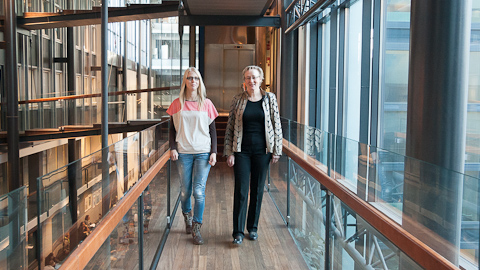The Graduate School of the University of Turku has remodelled its operations this year. In June 2013, 16 doctoral programmes were established at the Graduate School and each of the university’s 1800 doctoral candidates belongs to one of them. Since September 2013, the doctoral candidacy has to be applied for through the university’s doctoral programmes.
Graduate School Coordinator Eeva Sievi emphasises that all the doctoral candidates can expect equal support and instruction from the university, but for 200 of them, the university provides employment as doctoral trainees.
One of the new doctoral trainees is Sini Laari, who graduated last April as a Master of Science in Economics and Business Administration and is now working on her dissertation as a university employee.
- I research how companies realise environmental supervision and collaboration in their supply chains and how this affects their operations. I study this through the results and reliability of the companies. My new position guarantees that I can concentrate on my research full-time, says Laari.
Laari’s position as a doctoral trainee continues until the end of 2016, but some doctoral trainees’ employment periods are shorter, as the positions will be filled gradually from now on.
- In the future, one quarter of the funded doctoral trainee positions are open for application each year. How they are divided between different doctoral programmes is decided, among other things, on the basis of the profitability of each programme, says Sievi.
Third of the Applications from International Candidates
Sievi is particularly happy that the doctoral training positions sparked interest internationally as well. A little over third of the applications came from international candidates, even though the time table for the applications was challenging for foreign students. Many of the doctoral programmes required that the applicant already had a supervisor at the University of Turku and many of the applicants didn’t have enough time to find one.
- The application process has to be developed so that we can recruit international candidates more efficiently in the future. As doctoral training positions are opened every year from now on, we have a chance to make changes, says Sievi.
According to Aino Halinen-Kaila, who is the Director of the Doctoral Programme at the Turku School of Economics, 50 of the 96 applications received by TSE were submitted by an international candidate or a candidate with a foreign background. In the final stage of the qualification process, an international applicant received one of the longest positions.
- It is a great step forward that national and international candidates applying for the doctoral training positions have to meet the same requirements. In addition, it is a chance to better compete the international candidates as well. At TSE, internationality was part of the application process in that some of the outside assessors reviewing the applications were from foreign universities, says Halinen-Kaila.
Text and photo: Erja Hyytiäinen
Translation: Mari Ratia
